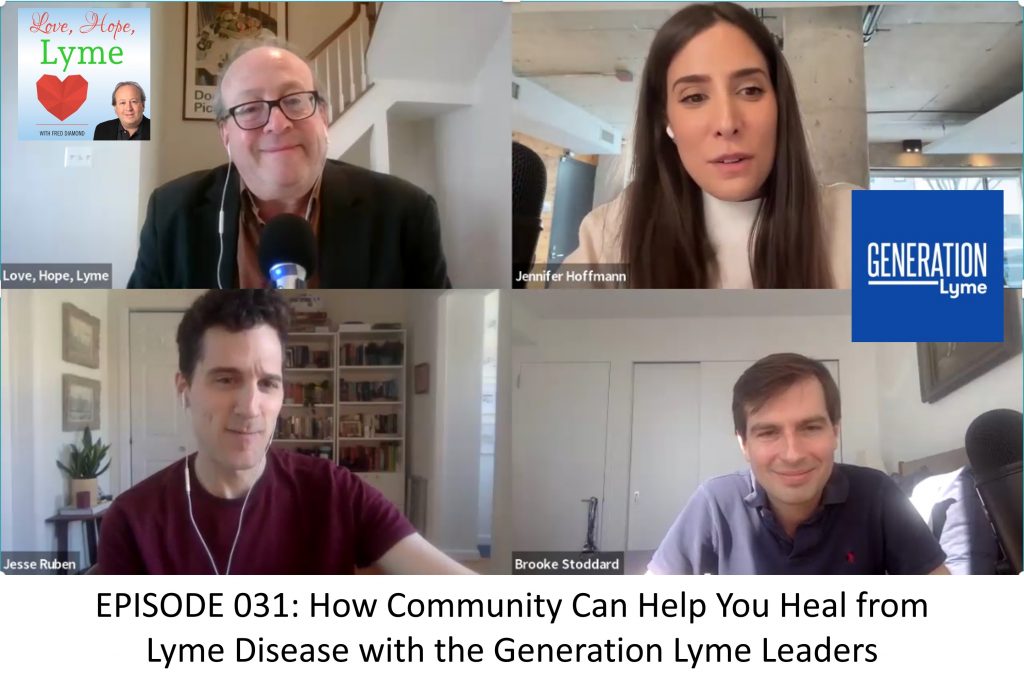PODCAST: Gen Lyme offers zoom support meetups 5x per week

By Fred Diamond
When I was doing the research for my book “Love, Hope, Lyme: What Family Members, Partners, and Friends Who Love a Chronic Lyme Survivor Need to Know,” I was pleased to discover that there were many supportive communities for Lyme survivors.
Most of the communities are online and are great resources for empathetic support, treatment advice, and general assistance. Often, these communities are led by Lyme survivors who have reached a level of healing and want to give back to the same community that was there for them.
One such community is run by Generation Lyme, also known as Gen Lyme.
On this week’s Love, Hope, Lyme podcast, the Gen Lyme leaders talked about their support offerings and how Lyme survivors can partake of them. They also shared their own personal journeys and where Lyme took them. It was at times a very emotional podcast.
The leaders I interviewed were Brooke Stoddard, Jennifer Hoffman, and Jesse Ruben.
Empowering patients and their circle

He continued, “We have a meetup for the LGBTQ community, college kids, an international meetup that’s earlier so people on other parts of the world can join, a late-night meetup for people on the West Coast.”
Hoffman said, “It’s important to have people that you can ask questions of and get answers to. With Lyme, you’re dealing with something that the medical community and public don’t understand very well. You need people who are going through it that you can talk to.”
She continued, “It’s helpful to be in a room with people who can look at you and say, “I get it. I’ve been there too. I’m there right now. You are not crazy.” You know you’re not alone. Feeling alone is very dangerous.”
Topics discussed at the meetups
Ruben said the topics discussed at the meet ups are wide-ranging and may include the mental and emotional aspects of Lyme disease.
He said, “When there are people that have been sick a little bit longer, symptoms are frequently discussed. Also, relationships, mental challenges, and the emotional side of Lyme disease are frequently discussed. Maybe you can’t work, maybe your self-worth and your value is in the toilet and you’re trying to figure out your purpose in the world. Anything you can imagine, because this disease impacts every aspect of your life.”
Stoddard said, “We often hear from meetup attendees that these are the only places where they feel like other people around them understand what they’re going through. All of us have friends and families and coworkers, and when we explain to them what we’re going through, they often do their best to understand.”
“But if they don’t have a tick-borne infection, they might not directly understand. When I go to a meetup and there are 10 other people there who have Lyme or other co-infections, and I say, “My fatigue was really bad recently,” they know exactly what that means. When everyone gets it, and I don’t have to explain it any further, it makes me so good.”
Hoffman shared, “In the past, I would’ve thought, “This is just me. No one else has it. It’s something nobody else can understand.” I know that there are hundreds of thousands, if not millions of people out there who get it, who can get it, who would get it, unfortunate as it is, and how powerful it is when we connect with each other, and how horrible it is to go through. Healing it can be when we find each other and reflect each other.”
How it’s helped them
Ruben said, “When you are sick, there’s two ways that you go. When you get better, you can walk away and say I’m never going to think of this again. The other path, which we have all taken, is that the disease is so horrible that I’m going to vow to do everything I can to make sure that no one must suffer the way that I am suffering right now.”
Stoddard added, “There’s something that happens when a new person comes to a meetup that says something almost universal about this community. Past attendees go out of their way to welcome someone new at the meetup and to do whatever they can to provide information or support. This community is full of people who have been through and are going through complicated journeys with their personal health. As part of that process, they really want to help other people.
Ruben said, “Our mission is how can we help Lyme patients right now. I used to think that I didn’t want to talk to anyone or burden them with this. We have seen time and time again how helpful it is to connect with people.”
You choose–camera on or off
He also shared that you determine how you want to participate in the groups.
“There are people who come and just listen for months, with their camera off. Then they turn their camera on and they’re fully participating. It’s amazing to see that change,” he said.
Stoddard concluded, “For anyone who’s listening who feels a sense of loneliness, or if you don’t feel like you have people around you who really get what you’re going through, Generation Lyme addresses those two issues. Our services are meant to help people going through the experience of tick-borne infection. If you are dealing with either of those two things personally, we hope that Generation Lyme can help you along the way.”
Click here to listen to all episodes of the Love, Hope, Lyme Podcast or on YouTube.
Click here for a schedule of Generation Lyme meetups.
Fred Diamond is based in Fairfax, Virginia and can be contacted via Facebook. His popular book, “Love, Hope, Lyme: What Family Members, Partners, and Friends Who Love a Chronic Lyme Survivor Need to Know” is available on Amazon. The e-version of the book is always free to Lyme survivors. PM Fred on Facebook for your copy.




















We invite you to comment on our Facebook page.
Visit LymeDisease.org Facebook Page